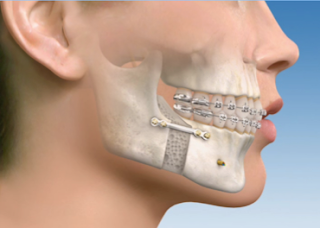 The jaws, teeth, skull, and face work together closely. So,
when one part malfunctions, it affects the other parts and the collective
rhythm is broken. That is why when you have a jaw problem, your forehead,
cheeks, and even your neck seems to hurt. Sometimes, to correct a problem of
this craniofacial system, surgery is needed. That is what we mean by
orthodontic surgery. It is more than using braces to correct overbite, cross
bite or under bite. Orthodontic surgery is known by another name – orthognathic
surgery.
The jaws, teeth, skull, and face work together closely. So,
when one part malfunctions, it affects the other parts and the collective
rhythm is broken. That is why when you have a jaw problem, your forehead,
cheeks, and even your neck seems to hurt. Sometimes, to correct a problem of
this craniofacial system, surgery is needed. That is what we mean by
orthodontic surgery. It is more than using braces to correct overbite, cross
bite or under bite. Orthodontic surgery is known by another name – orthognathic
surgery.
Who performs such surgeries?
A general orthodontics expert is trained to use conventional
and clear braces to correct tooth alignment. However craniofacial problems
require a higher level of expertise. That is why dentist in San Luis Obispo
will refer you to a maxillofacial surgeon in such a case. The specialists have
the necessary tools and the knowledge to deal with any related problem and you
are sure to receive the best care at their hands.
Who needs orthodontic surgery?
First of all, this surgery can only be performed on adults
because the jawbone needs to have completed its growth at the time of admitting
for treatment. Some people need surgery due to lingering problems such as
chronic temporomandibular joint disorder or TMD. Then there is malocclusion
that is complicated and cannot be addressed by braces. If there is a big
misalignment of the lower and upper jaws, teeth on each jaw will not meet
properly for the patient to bite food or even talk properly. In such cases,
surgery will be needed to correct the jaws and then braces can be used for fine
tuning alignment. These are situations when surgery is performed out of medical
need. Some people opt to have surgery to correct aesthetic concerns such as an
awkward shape of jaw making the face look disproportionate. This is optional
surgery.
To Learn More About Orthodontic Surgery, Please Visit: The Spa & Laser Center at Southside Dermatology
Tags to this Page: Orthodontic Surgery by Your Dentist in San Luis Obispo, Milde Family Orthodontics
No comments:
Post a Comment